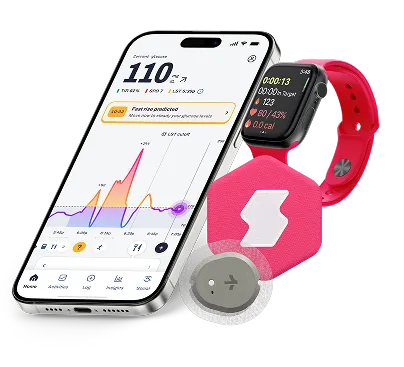Honeydew, often celebrated for its refreshing sweetness and juicy texture, is a member of the melon family known for its rich content of vitamins and minerals. While frequently recognized for its delightful taste and hydrating properties, its impact on blood sugar levels, as indicated by its low glycemic index, is often overlooked.
Honeydew is not only a rich source of vitamins C and B6, but it also contains essential nutrients like potassium and folate, making it a valuable addition to a balanced diet.¹ Understanding the interplay between its nutritional profile and low glycemic index can provide critical insights into its potential benefits for individuals managing diabetes and those aiming to maintain stable blood sugar levels.
Sign up to be the first to know about special offers and exciting Signos news.
Glycemic Index Table
Based on the provided information, the glycemic index (GI) of honeydew melon is approximately 65, which falls within the medium range.² Additionally, for a serving size of 100g, the carbohydrate content is roughly 8 grams.¹ To calculate the glycemic load (GL) per serving, the formula GL = (GI x Carbohydrate content per serving) / 100 can be used. Therefore, the GL per serving for honeydew melon is approximately 5.2.
Cooking can affect foods' glycemic index, but honeydew melon, which is commonly consumed raw, remains largely stable when consumed without cooking.
Understanding the glycemic index of honeydew melon is crucial for individuals, especially those managing their blood sugar levels, as it provides insights into how this fruit may impact their overall glycemic response. The carbohydrate content and glycemic load per serving can help individuals make informed dietary choices and manage their carbohydrate intake more effectively, contributing to better glycemic control.

Nutritional Facts
Honeydew is a nutrient-dense fruit with various health benefits due to its rich nutritional profile. It is an excellent source of vitamin C, providing about 30% of the daily recommended intake per 100 grams, which supports the immune system and promotes skin health.¹
Moreover, honeydew contains significant amounts of potassium, an essential mineral for maintaining healthy blood pressure levels. Honeydew also provides notable quantities of vitamin B6 and fiber, contributing to overall well-being.¹
The nutritional information below is for 100 g of honeydew.¹
Nutritional Facts

Is Honeydew Good for Weight Loss?
Honeydew can be a beneficial addition to a weight loss diet due to its low-calorie and high water and fiber content, promoting satiety and aiding in appetite control. Its sweet taste can also serve as a healthier alternative to sugary snacks, helping to satisfy cravings without significantly increasing calorie intake.
Furthermore, the presence of essential nutrients, such as vitamins C and B6, and minerals like potassium and folate, can support overall health and well-being during weight loss efforts.¹ Integrating honeydew into a well-balanced diet that emphasizes whole, nutrient-dense foods can contribute to a sustainable and effective weight management plan.
Is Honeydew Safe for People Living with Diabetes?
Honeydew can be considered a safe and beneficial fruit option for individuals living with diabetes owing to its relatively low glycemic index and moderate carbohydrate content. According to the American Diabetes Association (ADA), incorporating honeydew as part of a well-balanced diet can contribute to managing blood sugar levels. Its high water and fiber content may also help regulate blood glucose levels and promote satiety, which can aid in controlling appetite and preventing overconsumption of high-glycemic foods. However, it is crucial for individuals with diabetes to monitor their portion sizes and overall carbohydrate intake and to consult with a healthcare professional or a registered dietitian for personalized dietary recommendations.
Better health starts here.
Sign up for tips and insights that work for you!
Allergies
Allergies to honeydew are relatively uncommon, but they can manifest as oral allergy syndrome (OAS) in individuals sensitive to certain proteins in the melon. Symptoms of OAS may include itching and swelling of the lips, mouth, and throat, along with possible irritation of the skin.³ While severe allergic reactions are rare, individuals with a history of oral allergy syndrome or other food allergies should exercise caution and consult a healthcare professional if they experience any adverse reactions after consuming honeydew.

References
References
- USDA FoodData Central. (2019, April 1). Food Details - Melons, honeydew, raw. https://fdc.nal.usda.gov/fdc-app.html#/food-details/169911/nutrients
- The University of Sydney. (2023, May 1). Glycemic Index – Glycemic Index Research and GI News. https://glycemicindex.com/
- American Academy of Allergy Asthma and Immunology. (2020, September 28). Oral allergy syndrome. https://www.aaaai.org/tools-for-the-public/conditions-library/allergies/oral-allergy-syndrome-(oas)




.svg)
.svg)
.svg)
.svg)
.svg)
.svg)
.svg)
.svg)
